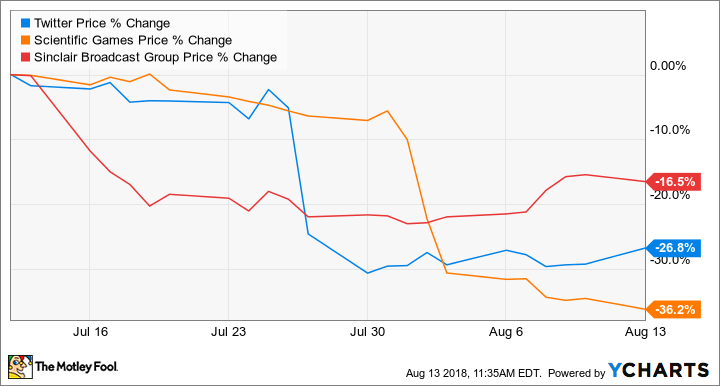3 of the Worst- Performing Stocks of the Past Month
Twitter Inc (NYSE: TWTR), Scientific Games Corp (NASDAQ: SGMS), and Sinclair Broadcast Group Inc (NASDAQ: SBGI) don't have a lot in common from a business perspective, but all three have plunged over the past month.
In each case, investors found a reason to be disappointed with long-term earnings growth potential. And when investors don't see high growth ahead, they're not likely to give a company a growth stock valuation.
Twitter's shrinking path forward
Twitter announced second-quarter 2018 results late in July, and they did little to prove a user growth path to investors. Monthly active users fell from 336 million in the first quarter to 335 million in the second quarter, reinforcing fears that growth has stalled. Investors glossed over the company's swinging from a $116 million GAAP loss a year ago to a $100 million GAAP profit, because in tech the name of the game is growth.
What shouldn't go unnoticed for long-term investors is that Twitter has been trying to clean up its platform to improve its user experience. The Washington Post reported the company purged 70 million accounts in May and June as part of a long-term effort to get rid of bots, abuse, and harassment.
A smaller user base may sound like a bad thing for Twitter, but if the user base is shrinking because it includes fewer bots and harassers, it's probably a good thing for the company's long-term health and engagement. As disappointed as investors were with the user numbers last month, I think Twitter is taking steps in the right direction for its user experience, and that should help long-term profits.

Image source: Getty Images.
When growth isn't enough
Scientific Games ran into a similar problem early in August, demonstrating growth, but not enough growth to please investors. Second-quarter revenue was up 10% to $844.7 million and net loss declined from $50.6 million to $5.8 million, but investors were expecting more.
The problem Scientific Games has is that it's trying to justify taking on $9.1 billion of debt from a series of acquisitions. In theory, consolidating gaming products from slot machines to lottery technology could give the company more pricing power, and therefore higher growth and margins, more than offsetting the cost of debt. But results haven't improved as quickly as investors hoped, and that's why shares are dropping.
While I wouldn't be too concerned about a single quarter, my worry is that Scientific Games is still losing money after nearly a decade of gaming growth and a growing economy. If the economy turns south and there's less money to be spent on games of chance, the company could be in trouble given its debt load.
Sinclair's power play takes a hit
Sinclair Broadcast Group seemed primed to become a dominant local broadcast company after it announced the acquisition of Tribune Media (NYSE: TRCO). If the merger had gone through, Sinclair would have reached 72% of U.S. television households. The deal seemed like a slam dunk with business-friendly Federal Communication Commission (FCC) Chairman Ajit Pai in place, but Pai threw the media industry for a loop when he publicly expressed concerns over the Sinclair-Tribune merger. He took exception with the stations the company intended to sell, which he said would leave Sinclair in control of the stations "in practice, even if not in a name" even if they were sold.
On Aug. 9, Tribune announced it had terminated the merger agreement with Sinclair and filed a lawsuit against Sinclair alleging breach of contract. "... Sinclair's entire course of conduct has been in blatant violation of the Merger Agreement and, but for Sinclair's actions, the transaction could have closed long ago," said the company in a press release.
Without Tribune under its wing, investors are less bullish on Sinclair's future in local broadcasting. It'll have less pricing power with advertisers and may have less operating leverage without cost synergies the deal would have brought. Expectations were high when the merger seemed likely and now that it's dead it shouldn't be surprising Sinclair's stock has taken a hit as well.
Falling expectations
Twitter, Scientific Games, and Sinclair Broadcast Group fell for different reasons over the past month, but the commonality is that investors see them as riskier today than they did a month ago. Higher risk isn't usually good for a stock price, and that's why we're seeing shares fall. It'll take time to sort out whether the short-term earnings concerns of Twitter and Scientific Games are going to negatively impact earnings long-term. For Sinclair, it may be limited on how many stations it can acquire now that the FCC announced misgivings about the Tribune acquisition plan, which could cap growth long-term.
In each case, investors have reason to be a little less bullish on each of these stocks after the past month.
More From The Motley Fool
Travis Hoium has no position in any of the stocks mentioned. The Motley Fool owns shares of and recommends Twitter. The Motley Fool has a disclosure policy.

 Yahoo Finance
Yahoo Finance 
